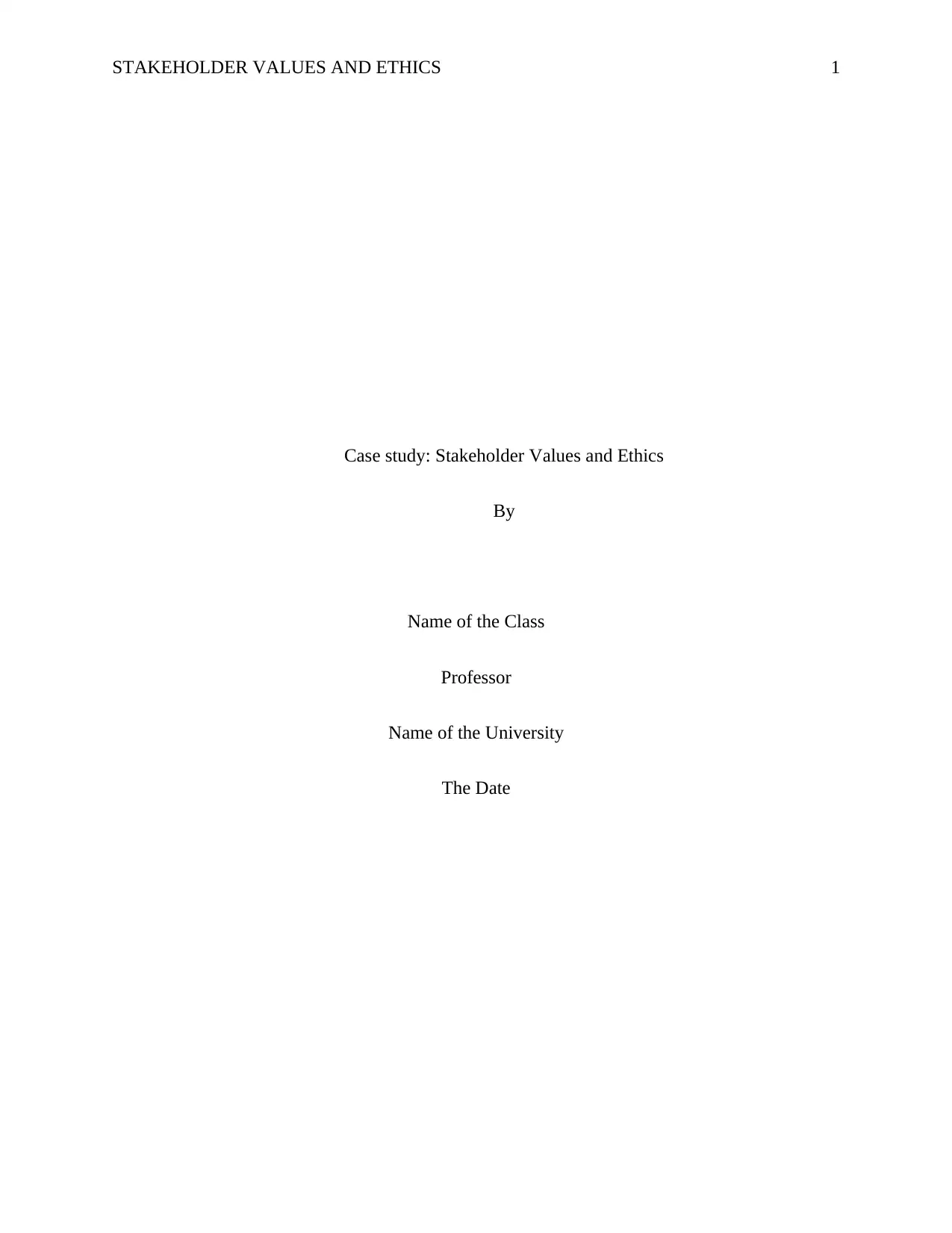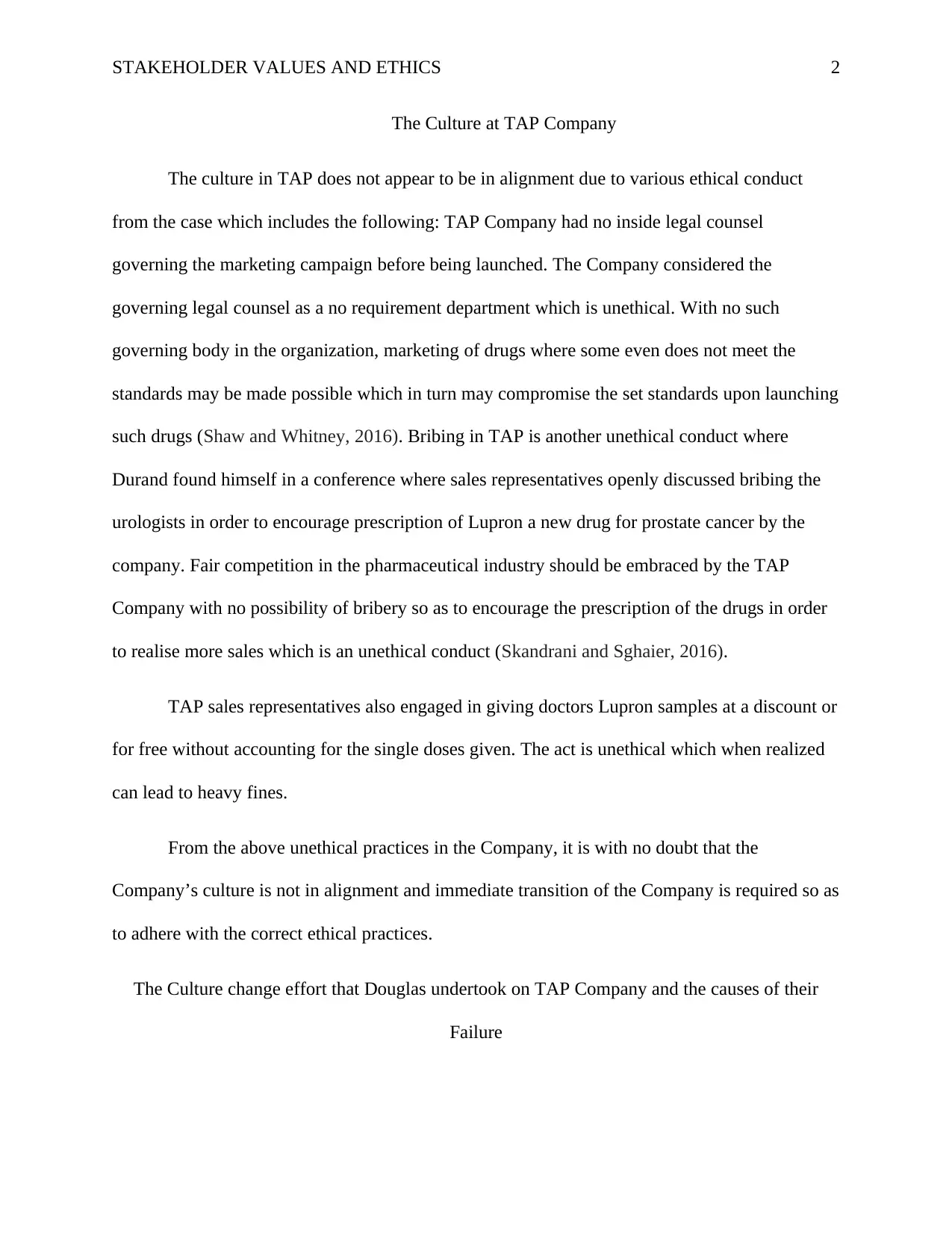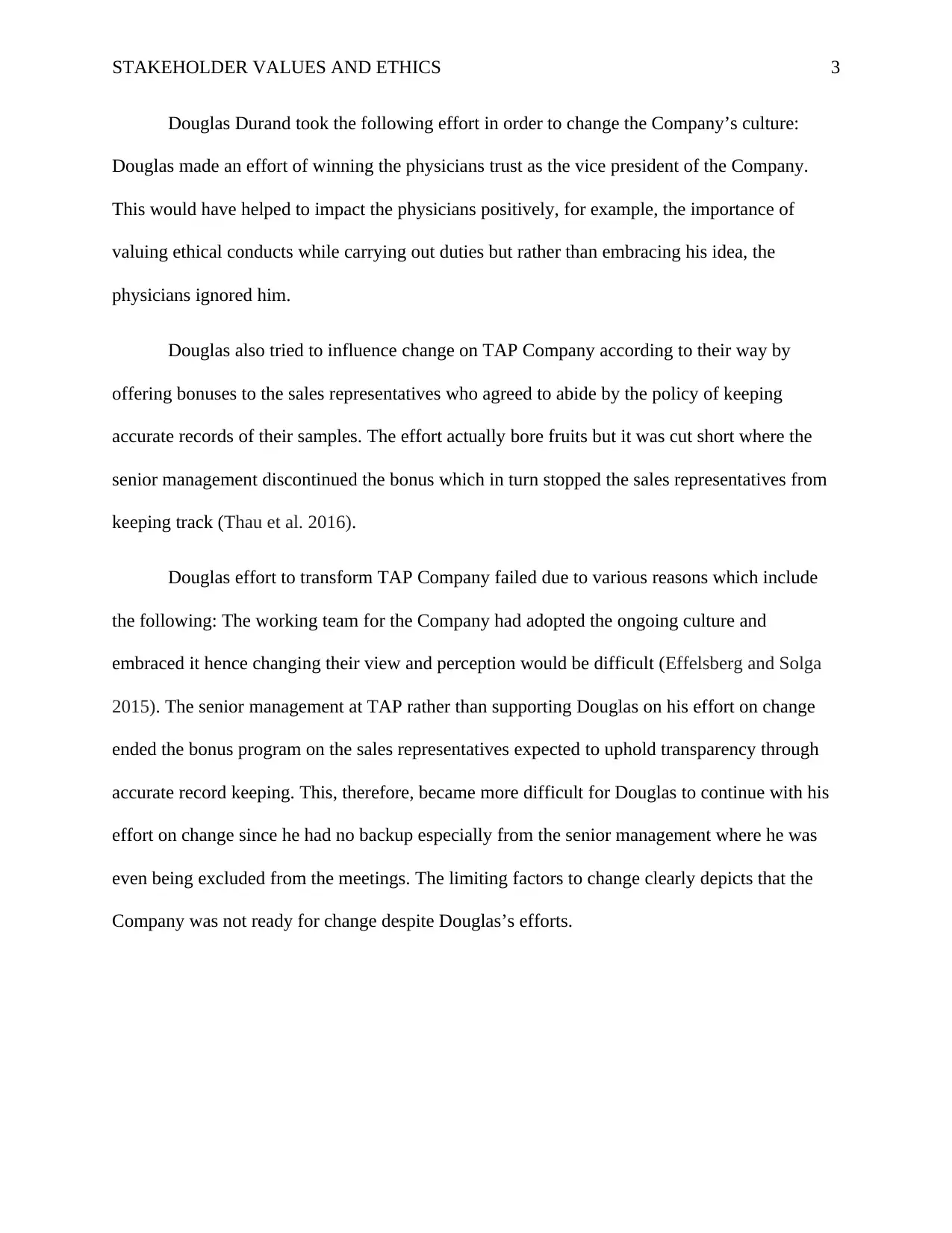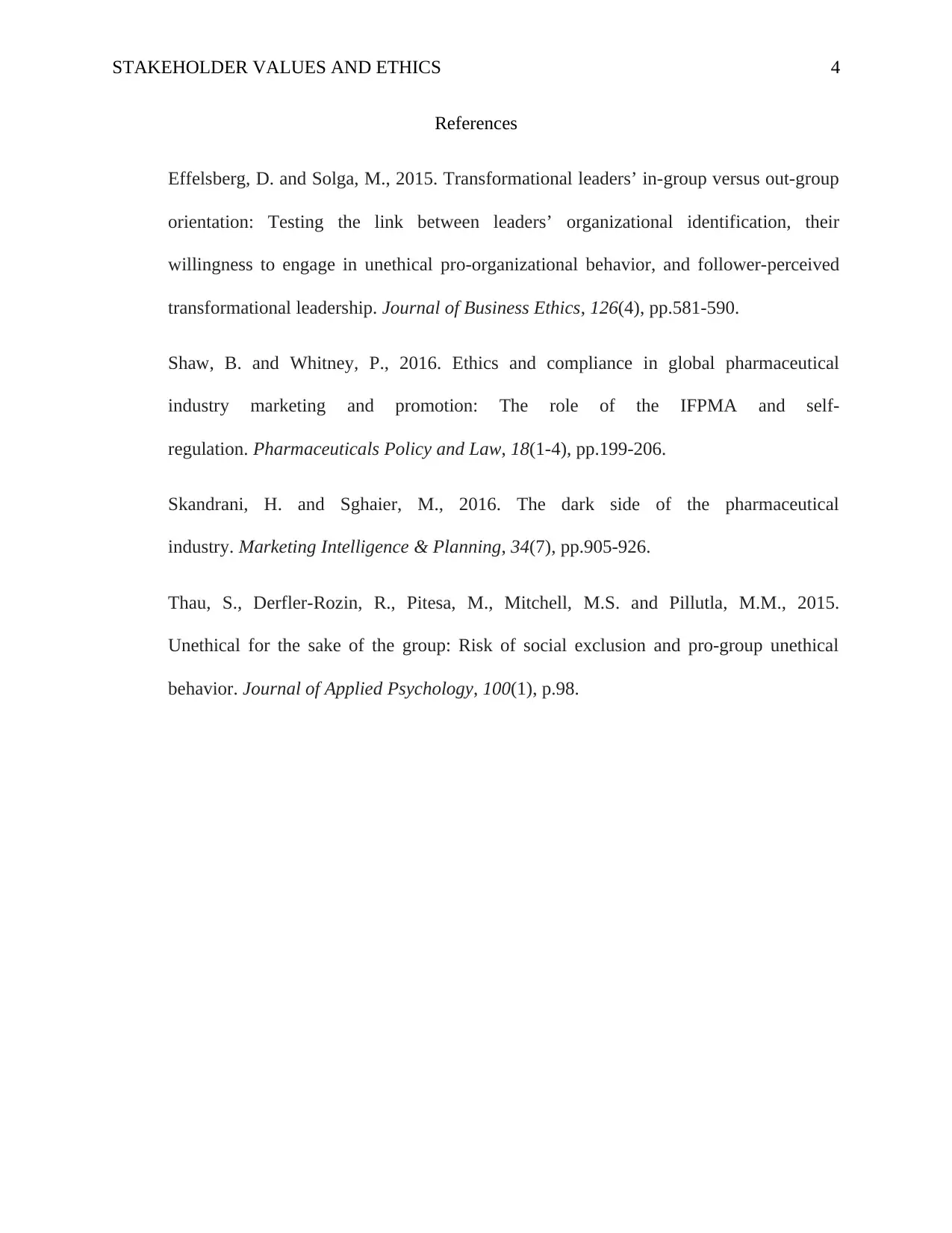Case Study: BAP61 Stakeholder Values and Ethics at TAP Pharma
VerifiedAdded on 2023/06/04
|4
|773
|368
Case Study
AI Summary
This case study analyzes the ethical culture at TAP Pharmaceuticals, highlighting misalignments such as the absence of internal legal counsel, bribery, and improper drug sample distribution. It evaluates Douglas Durand's unsuccessful efforts to change the company's culture, attributing his failure to resistance from the existing team, lack of senior management support, and the discontinuation of incentive programs for ethical behavior. The analysis underscores the limiting factors that prevented meaningful change within the organization. Desklib provides access to a wealth of similar case studies and academic resources for students.

STAKEHOLDER VALUES AND ETHICS 1
Case study: Stakeholder Values and Ethics
By
Name of the Class
Professor
Name of the University
The Date
Case study: Stakeholder Values and Ethics
By
Name of the Class
Professor
Name of the University
The Date
Paraphrase This Document
Need a fresh take? Get an instant paraphrase of this document with our AI Paraphraser

STAKEHOLDER VALUES AND ETHICS 2
The Culture at TAP Company
The culture in TAP does not appear to be in alignment due to various ethical conduct
from the case which includes the following: TAP Company had no inside legal counsel
governing the marketing campaign before being launched. The Company considered the
governing legal counsel as a no requirement department which is unethical. With no such
governing body in the organization, marketing of drugs where some even does not meet the
standards may be made possible which in turn may compromise the set standards upon launching
such drugs (Shaw and Whitney, 2016). Bribing in TAP is another unethical conduct where
Durand found himself in a conference where sales representatives openly discussed bribing the
urologists in order to encourage prescription of Lupron a new drug for prostate cancer by the
company. Fair competition in the pharmaceutical industry should be embraced by the TAP
Company with no possibility of bribery so as to encourage the prescription of the drugs in order
to realise more sales which is an unethical conduct (Skandrani and Sghaier, 2016).
TAP sales representatives also engaged in giving doctors Lupron samples at a discount or
for free without accounting for the single doses given. The act is unethical which when realized
can lead to heavy fines.
From the above unethical practices in the Company, it is with no doubt that the
Company’s culture is not in alignment and immediate transition of the Company is required so as
to adhere with the correct ethical practices.
The Culture change effort that Douglas undertook on TAP Company and the causes of their
Failure
The Culture at TAP Company
The culture in TAP does not appear to be in alignment due to various ethical conduct
from the case which includes the following: TAP Company had no inside legal counsel
governing the marketing campaign before being launched. The Company considered the
governing legal counsel as a no requirement department which is unethical. With no such
governing body in the organization, marketing of drugs where some even does not meet the
standards may be made possible which in turn may compromise the set standards upon launching
such drugs (Shaw and Whitney, 2016). Bribing in TAP is another unethical conduct where
Durand found himself in a conference where sales representatives openly discussed bribing the
urologists in order to encourage prescription of Lupron a new drug for prostate cancer by the
company. Fair competition in the pharmaceutical industry should be embraced by the TAP
Company with no possibility of bribery so as to encourage the prescription of the drugs in order
to realise more sales which is an unethical conduct (Skandrani and Sghaier, 2016).
TAP sales representatives also engaged in giving doctors Lupron samples at a discount or
for free without accounting for the single doses given. The act is unethical which when realized
can lead to heavy fines.
From the above unethical practices in the Company, it is with no doubt that the
Company’s culture is not in alignment and immediate transition of the Company is required so as
to adhere with the correct ethical practices.
The Culture change effort that Douglas undertook on TAP Company and the causes of their
Failure

STAKEHOLDER VALUES AND ETHICS 3
Douglas Durand took the following effort in order to change the Company’s culture:
Douglas made an effort of winning the physicians trust as the vice president of the Company.
This would have helped to impact the physicians positively, for example, the importance of
valuing ethical conducts while carrying out duties but rather than embracing his idea, the
physicians ignored him.
Douglas also tried to influence change on TAP Company according to their way by
offering bonuses to the sales representatives who agreed to abide by the policy of keeping
accurate records of their samples. The effort actually bore fruits but it was cut short where the
senior management discontinued the bonus which in turn stopped the sales representatives from
keeping track (Thau et al. 2016).
Douglas effort to transform TAP Company failed due to various reasons which include
the following: The working team for the Company had adopted the ongoing culture and
embraced it hence changing their view and perception would be difficult (Effelsberg and Solga
2015). The senior management at TAP rather than supporting Douglas on his effort on change
ended the bonus program on the sales representatives expected to uphold transparency through
accurate record keeping. This, therefore, became more difficult for Douglas to continue with his
effort on change since he had no backup especially from the senior management where he was
even being excluded from the meetings. The limiting factors to change clearly depicts that the
Company was not ready for change despite Douglas’s efforts.
Douglas Durand took the following effort in order to change the Company’s culture:
Douglas made an effort of winning the physicians trust as the vice president of the Company.
This would have helped to impact the physicians positively, for example, the importance of
valuing ethical conducts while carrying out duties but rather than embracing his idea, the
physicians ignored him.
Douglas also tried to influence change on TAP Company according to their way by
offering bonuses to the sales representatives who agreed to abide by the policy of keeping
accurate records of their samples. The effort actually bore fruits but it was cut short where the
senior management discontinued the bonus which in turn stopped the sales representatives from
keeping track (Thau et al. 2016).
Douglas effort to transform TAP Company failed due to various reasons which include
the following: The working team for the Company had adopted the ongoing culture and
embraced it hence changing their view and perception would be difficult (Effelsberg and Solga
2015). The senior management at TAP rather than supporting Douglas on his effort on change
ended the bonus program on the sales representatives expected to uphold transparency through
accurate record keeping. This, therefore, became more difficult for Douglas to continue with his
effort on change since he had no backup especially from the senior management where he was
even being excluded from the meetings. The limiting factors to change clearly depicts that the
Company was not ready for change despite Douglas’s efforts.
⊘ This is a preview!⊘
Do you want full access?
Subscribe today to unlock all pages.

Trusted by 1+ million students worldwide

STAKEHOLDER VALUES AND ETHICS 4
References
Effelsberg, D. and Solga, M., 2015. Transformational leaders’ in-group versus out-group
orientation: Testing the link between leaders’ organizational identification, their
willingness to engage in unethical pro-organizational behavior, and follower-perceived
transformational leadership. Journal of Business Ethics, 126(4), pp.581-590.
Shaw, B. and Whitney, P., 2016. Ethics and compliance in global pharmaceutical
industry marketing and promotion: The role of the IFPMA and self-
regulation. Pharmaceuticals Policy and Law, 18(1-4), pp.199-206.
Skandrani, H. and Sghaier, M., 2016. The dark side of the pharmaceutical
industry. Marketing Intelligence & Planning, 34(7), pp.905-926.
Thau, S., Derfler-Rozin, R., Pitesa, M., Mitchell, M.S. and Pillutla, M.M., 2015.
Unethical for the sake of the group: Risk of social exclusion and pro-group unethical
behavior. Journal of Applied Psychology, 100(1), p.98.
References
Effelsberg, D. and Solga, M., 2015. Transformational leaders’ in-group versus out-group
orientation: Testing the link between leaders’ organizational identification, their
willingness to engage in unethical pro-organizational behavior, and follower-perceived
transformational leadership. Journal of Business Ethics, 126(4), pp.581-590.
Shaw, B. and Whitney, P., 2016. Ethics and compliance in global pharmaceutical
industry marketing and promotion: The role of the IFPMA and self-
regulation. Pharmaceuticals Policy and Law, 18(1-4), pp.199-206.
Skandrani, H. and Sghaier, M., 2016. The dark side of the pharmaceutical
industry. Marketing Intelligence & Planning, 34(7), pp.905-926.
Thau, S., Derfler-Rozin, R., Pitesa, M., Mitchell, M.S. and Pillutla, M.M., 2015.
Unethical for the sake of the group: Risk of social exclusion and pro-group unethical
behavior. Journal of Applied Psychology, 100(1), p.98.
1 out of 4
Related Documents
Your All-in-One AI-Powered Toolkit for Academic Success.
+13062052269
info@desklib.com
Available 24*7 on WhatsApp / Email
![[object Object]](/_next/static/media/star-bottom.7253800d.svg)
Unlock your academic potential
Copyright © 2020–2026 A2Z Services. All Rights Reserved. Developed and managed by ZUCOL.





